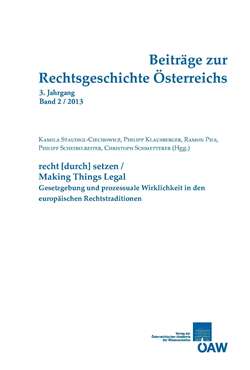
Beiträge zur Rechtsgeschichte Österreichs 2 / 2013, pp. 570-580, 2014/01/30
recht [durch] setzen - Making Things Legal.
Gesetzgebung und prozessuale Wirklichkeit in den europäischen Rechtstraditionen

On the 14th of June 538, the Emperor Justinian issued a constitution known as Novel 74 in the Corpus Iuris Civilis. The aim of this constitution was to determine all the possibilities for the legitimation of 'natural' children. In Novel 74 Justinian determined what the conditions are that allow children to be called either natural or legitimate as well as who the children are who are neither legitimate nor natural. After that, he created three mechanisms to legitimate children: by their parents' marriage, by imperial decision on demand of the father, or on the children's demand based on their father's testament. But is this legislation as new as Justinian pretends it to be?